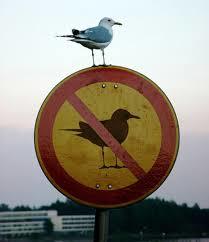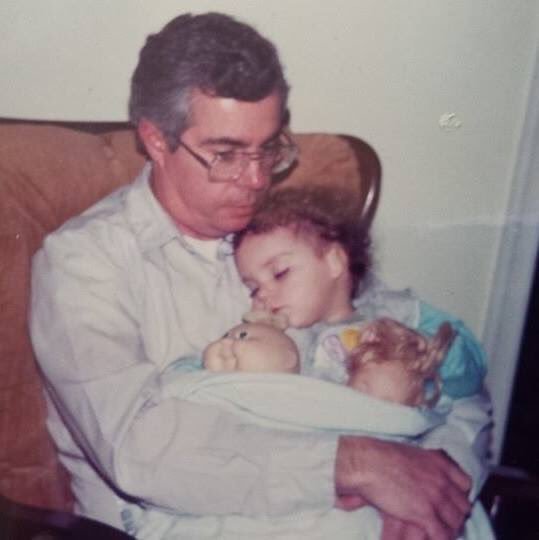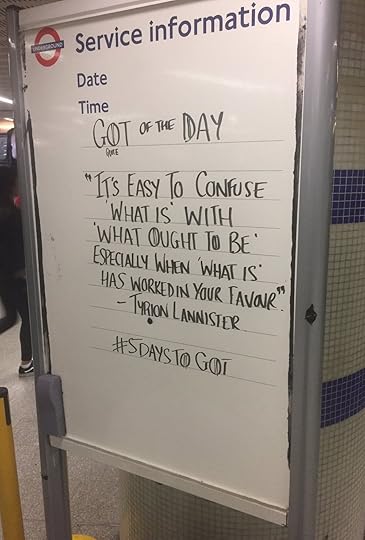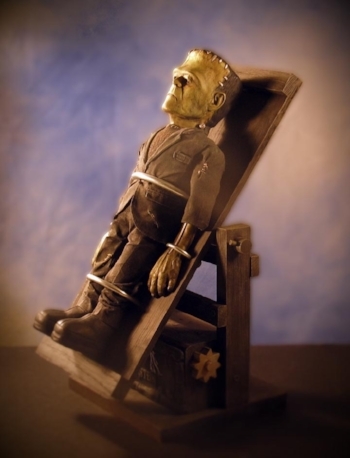Matthew Dicks's Blog, page 264
August 23, 2017
Boy and bear
You know what's even more overhyped than a partial eclipse?
The panda. I know I sound like a curmudgeon, but every time I see the panda at the National Zoo, I can't help but think, "Yup. It's a bear. Black and white, but really, just another bear."
My friends find bears wandering in their suburban backyards all the time. Larger, more impressive bears than this solitary, bamboo-eating machine.
Even Charlie wasn't all that impressed.

This is what a free and excellent media looks like
This is the way journalists should conduct an interview. This should be taught in journalism school.
This is exactly what people want from the media:
Hold public officials and hackneyed pundits accountable.
August 22, 2017
The eclipse was underwhelming and a little boring. I wish it happened more often.
I was prepared to be underwhelmed by the eclipse. As infrequent as these things may be, a briefly, slightly darker version of the world for a short period of time did not strike me as warranting the hype.
In stark contrast to my cynicism, Elysha hosted an eclipse party. Four other families brought their children over to watch the eclipse. Over the course of two hours, Elysha taught eight children to make eclipse viewers out of cereal boxes and decorate eclipse-themed cupcakes. Then she brought everyone outside to view the eclipse with actual eclipse glasses (which she somehow managed to acquire that morning), as well as their surprisingly effective homemade eclipse viewers.
There was food, drink, and fun. I swear that she threw the whole thing together in about four minutes.
The eclipse itself was underwhelming. The quality of the light shifted for about 30 minutes. I watched the moon pass in front of the sun.
Still, the world got a little darker for a little bit of time. That was it.
But here is what I loved:
Americans came together around a single, non-tragic event.
Our culture is rarely as ubiquitous as it was when I was young. No longer are Americans gathering around the television by the tens of millions to watch the final episode of M*A*S*H or the latest episode of Seinfeld. Movies like Star Wars, Titanic, and ET: The Extraterrestrial do not draw wholesale segments of America any longer. Radio is rapidly diminishing, making it harder for a song to gain cultural purchase.
Our culture is becoming fragmented and fractured as personal choice, facilitated by the digital age, allows Americans to curate their own content with remarkable ease.
This isn't all bad. Voices that were once stifled in a three network television system, a music industry full of gatekeepers, and a film industry that required millions of dollar to produce a movie can now be heard. Television content is better than it's ever been. Music is more diverse than ever before. Services like YouTube have allowed talented, creative, hard working people to circumvent the gatekeepers of the past and reach millions of viewers.
But we have so little that brings America together absent tragedy or divisiveness.
The Super Bowl
Holidays like Thanksgiving and the Fourth of July
The Oscars
The occasional viral video
The Ice Bucket Challenge
The Woman's March, to a degree, brought vast segments of Americans together, but even that was not without protest. Similarly, Saturday Night Live is a cultural touchstone, but based upon their recent political material, not everyone would agree.
Yesterday's eclipse brought the country together for a moment of unity. The vast majority of Americans were looking at the same thing at the same time, absent politics, religion, or tragedy.
That was good.
I thought the eclipse was fairly underwhelming. I wish it happened more often.




August 21, 2017
The ineffectiveness of signage
A rule of signage that people don't seem to understand:
Signs only work on people who obey signs.
I worked with teachers this summer who wanted to hang signs on campus to enforce rules that they already had the power to enforce. Parents who were visiting the school weren't adhering to the limitations outlined during orientation, so the teachers wanted signs so they could point to something in the event they were required to act as an authority figure.
As if a sign would abdicate them of any responsibility and therefore eliminate any potential confrontation.
"Sorry, sir. You can't be in this building. It's not me. It's the sign."
"Apologies, ma'am. But did you see the sign? It says you can't be here."
I tried to explain that parents already understood the rules and were purposely violating them. The signs weren't telling these parents anything they didn't already know. Therefore, additional signage would not change behavior.
Human intervention was required.
I know this because I am not a rule follower. If I see a rule as arbitrary or ridiculous or unfair, I often disobey the rule. I plow through signs quite often. For people like me, a sign is irrelevant if we do not agree to the rule stipulated on the sign. A sign is merely a suggestion about how the world should operate, but if that vision of the world strikes me as unnecessary, inefficient, arbitrary, or a hindrance to the way I think the world should operate, a sign is not going to stop me.
The authority behind the sign may alter my behavior. The parking ticket or the air marshal or the social pressure applied by friends or colleagues may convince me to adhere to the rules, but a sign?
No.
When people are knowingly disobeying the rules, signs will rarely stop them, and they do not afford an ounce of backup or support to the person required to enforce them.





As a person who has accepted the responsibility of your position, you must enforce the rules. You must confront people like me and explain the expectation is and the potential consequences of failing to meet these expectations. I know that for some of these teachers, that would be hard. An annoyed, angry, or entitled parent is not pleasant. Confrontations aren't always fun.
But when you accept the job, you accept the responsibility that comes with it.
Signs won't do your job for you. Nor will they offer any support when you're dealing with someone like me. Decent people who are also rule breakers will often abdicate in the face of authority. If pressed on the issue, we will usually alter our behavior.
But not always.
I was photographing the menu outside the cafeteria at Kripalu, hoping to send it to Elysha so she could tell me what to try (since I recognized nothing on the menu). As I was snapping my photo, a woman approached.
"I'm sorry," she said. "But this is a cellphone free floor."
I considered debating her on the subject. "Listen, if I had a camera in my hand right now, you'd have no complaint. So can we just pretend that this is just a camera for a moment? I'd like to take a photograph of your menu and send it to my wife so she can tell me what I might want to try, since I don't know recognize anything on your menu. I'm a heathen. A man child. Uncouth."
Instead, I asked, "Are you going to take my phone away if I keep using it?"
"No," the woman said, looking befuddled.
I smiled. "Then I'm going to keep using it for a minute or two."
Never tell a rule breaker that there is no consequence to breaking a rule.

August 20, 2017
Don't forget.
This little baby girl grew up and became a warrior who stood against hate and injustice.
Heather Heyer.
Say her name. Remember her name.

August 19, 2017
A possible (though not advised) replacement for heart medication
I spent a week at Kripalu Institute for Yoga and Health last week, teaching storytelling to a dozen remarkable people.
On Tuesday night I performed my one-man show, and on Thursday evening, ten of the storytellers from class took the stage and performed.
It was an extraordinary night.
One of my storytellers had not spoken to a group of people in more than 15 years after suffering a terrible embarrassment in high school. Just standing in front of 50 people was an enormous accomplishment for her. I felt so honored to give her the space and support to help her conquer this enormous fear.
Then she proceeded to make the audience roar with laughter with a hilarious and moving story about her childhood. It turns out that she's a storyteller.
Several of the storytellers stood before this audience of strangers and told stories about parts of their lives that they had never shared before. Hard parts. Haunting parts. The parts that require more bravery to tell than most people can muster.
There was laughter and tears. Gasps and guffaws. Hilarity and heartbreak. There were lines that I will never forget. "Golden sentences" one of my storytellers dubbed, and she was right. It was 90 minutes of beauty nestled in the quiet mountains of the Berkshires. It was dark outside, but each storyteller shone bright that night.
After the show, a man approached me. He reached into his pocket, removed a small container, and held it out for me to see. He explained that he suffered from a heart condition, and this was his nitroglycerin. The medication he needed if his heart started "acting up."
"But I feel like I should throw this away," he said. "My heart doesn't need medication. It needs what you did on Tuesday night and these people did tonight. I've listened to all these stories, and my heart hasn't felt this good in twenty years. This is what people need. This is what I need."
I suggested that he keep the nitroglycerin close in the event a storyteller is not available when his heart started "acting up" again, and he agreed.
But he was right.
Stories are good for the heart and good for the soul.



August 18, 2017
Thoughts on hiring
I think we should hire people for any and all jobs using the following procedure:
1. Interview the last five people who served the candidate in a restaurant. Inquire about how the candidate treated them over the course of the meal.
2. Interview the candidate. Ask the following questions:
Please explain the Bill of Rights to your best ability.Tell me about the last three books you read.Tell me about one goal or aspiration that you have yet to achieve. Are you a good person?Unorthodox but effective, I think.

August 17, 2017
Tyrion Lannister got it right.
It's hard to acknowledge your privilege when you've enjoyed it for your whole life.
It's even harder to admit that your success is very much the result of that privilege, and that your self-perceived story of hard work, sacrifice, discipline, and skill might be entirely different absent your privilege of race, nation, gender, socioeconomic class, or health.
Someone who has been listening to me stories this week said to me, "It's amazing that you've come so far given where you once were."
I replied, "I'm a healthy, intelligent, white man in America. Even with the misfortune that I've suffered in life, I was already hugely advantaged from the get-go. Change the color of my skin or my gender or stick me in a third world country, and my story is probably very different. My path might have been hard, but it was a hell of a lot easier than most people of the world."
It seems to me that there are a segment of people in America today who enjoy the same or similar privileges but refuse to to recognize their good fortune. They feel like victims rather than the benefactors of a lottery that afforded them enormous privilege. They fail to see that the struggle of others is in large part the result of institutions that make their path more difficult because of their race, gender, or country of origin.
It made me think of these words, spoken by fictional Game of Throne's character Tyrion Lannister:

August 16, 2017
This, too, shall pass.
We spent last week in Washington, DC. We visited with good friends, ate good food, toured the museums and the monuments, and had a grand time.
What I will always remember about this trip, however, is the way my daughter's insatiable curiosity, her incessant reading, and her mother's influence have transformed her into a student of the world.
Clara loves Clara Barton. This love began with the name they share, but it quickly grew into a genuine interest and love affair with this woman. She's read several books on Barton and can detail her life history if you have about an hour.
The Clara Barton home is coincidentally just a couple of miles from our friend's home, so we stopped to visit. We were sad to discover that the house is closed. Though it's designated as a historic site (it was also the first headquarters of the Red Cross), it's in disrepair, and it doesn't look like it will be open anytime soon.
We went to look at it even though we knew it was closed, planning on taking a photo of Clara standing outside the house. Instead, we were met by three men who were inspecting the building, and one offered to bring just Clara and Elysha inside. He gave them a private tour of the home, and he and Clara exchanged Clara Barton tidbits.
It was almost better than the house being open to the public. Clara was the first child in a long time to enter the home, making the moment for her very special.




Later that evening, we were touring the FDR monument when Clara spotted a statue to Eleanor Roosevelt, a remarkable politician in her own right. Clara began spouting facts about this female American icon as well, but she also asked at least twice as many questions.


We ended our tour of the monuments that evening at the Lincoln Memorial. Having lived in DC for six months, I'd visited this monument many times, but it was just as awe inspiring this time.
My son, Charlie, couldn't believe that we were allowed to step inside. He asked an endless stream of questions about the architecture and Lincoln himself.
Elysha and Clara sat down in the north chamber so that Elysha could read her the Gettysburg Address aloud.




It's easy in today's political climate to become despondent over all that we see. It's not hard to lose hope and perhaps think that our country is spiraling in the wrong direction.
I am not immune to these sentiments from time to time, and I am an optimist and an anti-alarmist.
But my trip to Washington renewed my spirit.
Abraham Lincoln led our country through the Civil War. Millions of Americans died on American soil in a battle for the future of our union.
Clara Barton served as a nurse during the Civil War. She witnessed horrors beyond imagination in a time when women did not have the right to vote and lacked many of the basic rights and privileges enjoyed by women today.
Eleanor Roosevelt helped to lead our country through the Great Depression and World War II.
These were some of America's most challenging times.
Yet here we stand today. Our country persists.
The not hard to imagine the despair that Americans must have been feeling during the times of Lincoln, Barton, and Roosevelt. I must have been easy for those men and women to lose hope in the future of their country.
Yet they fought. They battled. They persisted. Just like we will.
My greatest hope comes from the wide-eyed, insatiable curiosity of my children and their inherent desire to, in the words of Abigail Adams, do good and be good.
Lincoln, Barton, Roosevelt, and their generations of Americans faced enormous, almost unimaginable challenges, and they won. They preserved and protected this nation for future generations.
Just like I know we will, for Clara, Charlie and their future generations.
August 15, 2017
I don't sleep like a robot. Or Frankenstein. Do I?
I'm teaching storytelling at Kripalu Center for Yoga and Health this week.
This morning, I returned to my room to find a note from housekeeping:
"You don't need to make the bed."
I laughed. I didn't make the bed. When I went to sleep last night, I climbed onto the bed and simply fell asleep atop the sheets and blanket. It was a warm, summer night, so I had no need to slide beneath the covers.
When I woke up in the morning, I was still in the same position, lying flat on my back in the center of the bed. I stood up, leaving a perfectly made bed behind me.
I told some people in my workshop about the note, and they looked at me like I was a monster.
"You just fell asleep on top of the covers?" one woman asked. "Who does that?"
"I can't fall asleep if I'm not under the covers," said another.
"What kind of monster are you?" a third asked.
There were mentions of Frankenstein as well, and one person suggested that I might be a robot.
I really didn't expect this reaction.
I've always been able to fall asleep this way. At summer camp as a boy, I often slept atop my sleeping bag because of the heat. I've taken naps at work when I was sick by lying down on the carpeted floor and falling asleep during my lunch hour. When I was homeless and living in my car, I slept on the backseat, where blankets and sheets were impossible.
Is this really as strange as the folks in my workshop made it seem?




